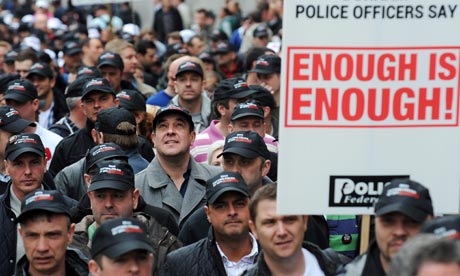
Police officers march on London, wearing 16,000 black caps to symbolise potential job losses. Photograph: Andy Rain/EPA
They were out of uniform, of course, but some habits die hard. As tens of thousands of off-duty police officers gathered in central London on Thursday to march against job cuts and changes to their pension deals, march organisers handed them baseball caps, which the overwhelmingly majority promptly, obediently, put on.
Some of the hats – 16,000 to be precise – were black, to represent the number of jobs that the Police Federation of England and Wales estimates could be lost under proposed cuts to policing services. Others were white, representing nothing more than that they had run out of black ones. It made an impressive image – a long, snaking and terribly well-behaved crowd, looking exactly like a bunch of police officers on their day off.
This was no leisurely day out, however. The march, past the Home Office, the Houses of Parliament and along Whitehall, might have been unusually mannerly – "the quietest demo ever", as the shadow defence secretary, Jim Murphy, tweeted from his office overlooking the route – but the mood was determined and frequently angry.
"Utterly betrayed," read the hand-made placard carried by David Ginn, a Metropolitan police dog handler based in south-west London. "No right to strike – every right to be screwed."
"Of course we're angry, we're very angry," he said as the march set off. "We've been treated with the most grotesque disrespect by this government." It was not all their fault, he acknowledged, and some belt-tightening was necessary. "We will take our share of the hit, but it would seem that our share is disproportionate, because we cannot strike." Of his team of 10, eight had turned out, all of them either on a scheduled day off or taking leave.
"We're here to show the public how strongly we feel about this," said one young frontline officer from Surrey, who, like many of those marching, preferred not to give her name. "I don't think the public realise what we're going through." She signed up three years ago to what she thought was a career for life, she said, but with 20% cuts to the policing budget, she was already seeing job losses among her team and fewer chances of promotion. People feared for the jobs, and she admitted she had thought of looking elsewhere. "The problem is, all the jobs I would be good at, civil service jobs, they are all being cut back too."
However great the frustration of those involved, it was not only their orderliness that marked this out as no ordinary protest. "All right mate!" shouted one marcher as the demo began to snake towards the Home Office. He had spotted a friend among the on-duty officers charged with policing the demo – distinguished by their fluorescent jackets and slightly bemused air – and bounded across to give him a hug. "Haven't seen you in ages! What have you been up to?"
Similarly, as the march processed along Whitehall ("Caps off, lads, as we pass the cenotaph"), it passed a number of police vans full of officers keeping an eye on a small, separate demonstration outside Downing Street, against the visit of the Pakistani prime minister. A handful of police marchers began to applaud as they passed the vans. One on-duty officer raised a discreet fist in a salute of solidarity.
As they rounded on to Parliament Square, the marchers encountered a separate protest being co-ordinated by striking public sector workers, and matters became briefly surreal. Some of those holding Unite banners applauded, while one man next to them shouted: "Remember what you lot did to the miners!" A tiny but rowdy group from the Socialist Workers party shouted: "Charge the police!"
"Have a bath," came the reply.
Simon Newport, a constable with North Wales police in Colwyn Bay, had worked from 6pm to 3am on Wednesday night, and come straight from his shift to catch the coach to London at 4am. It had been a typical night – two assaults, several domestics, paperwork for a couple of arrests. "A quiet one." All the same, he said, "you would be alarmed if I told you how few of us were on duty … Staff levels are critical."
Parallel cuts to other services make things even harder, he said, citing a recent example when ambulance service shortages meant an injured woman had to wait so long for treatment that "it led to a public order situation", requiring the police to make arrests.
"I'm careful not to scaremonger, but for the small force that we are, and the large area we cover, we are close to breaking point at certain times of day."
Two hundred officers felt strongly enough about the issue to make the journey from north Wales, a pattern echoed in forces across the country. How many had attended in total? The Police Federation was confident there had been more than 35,000. The Metropolitan police, as is now their habit with all protests, declined to say.

No comments:
Post a Comment